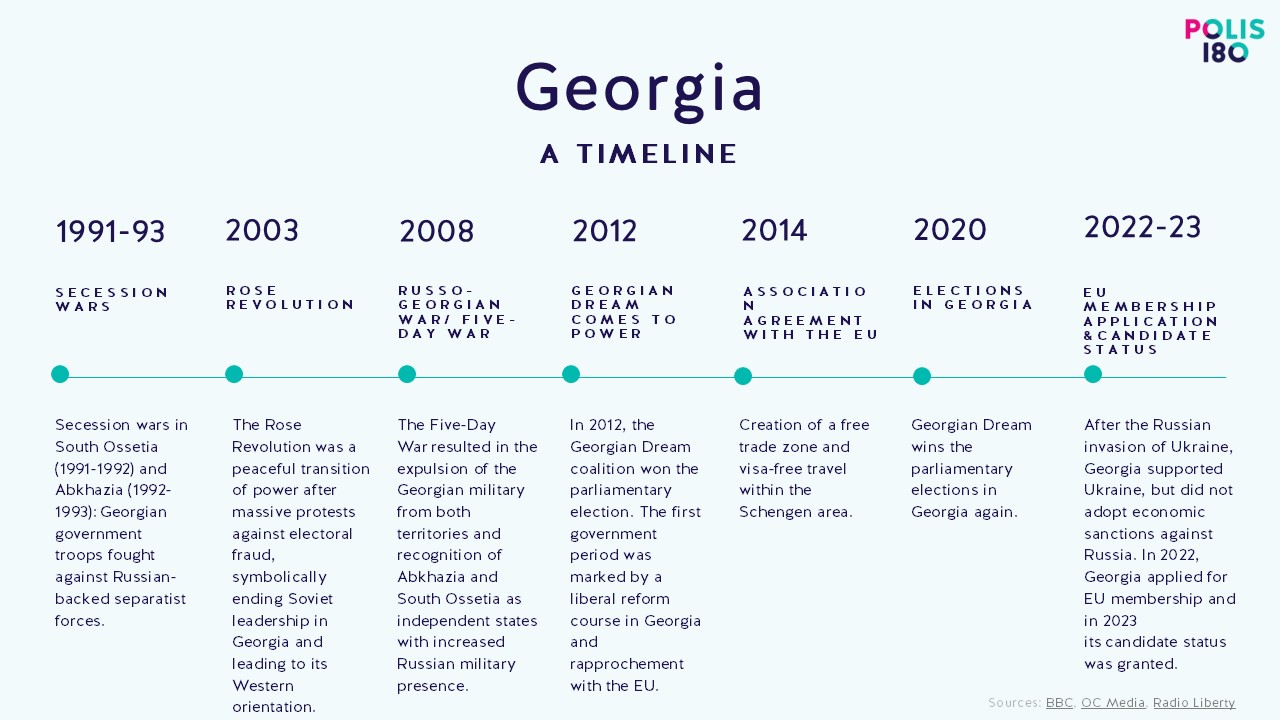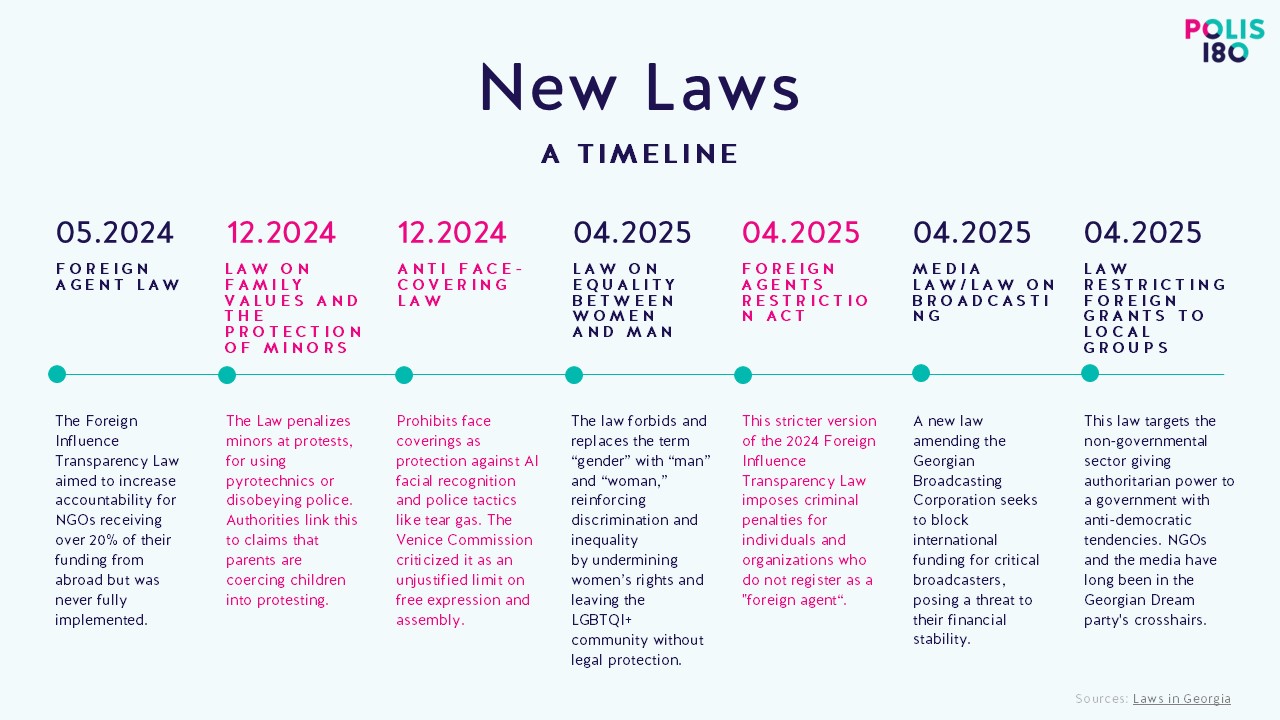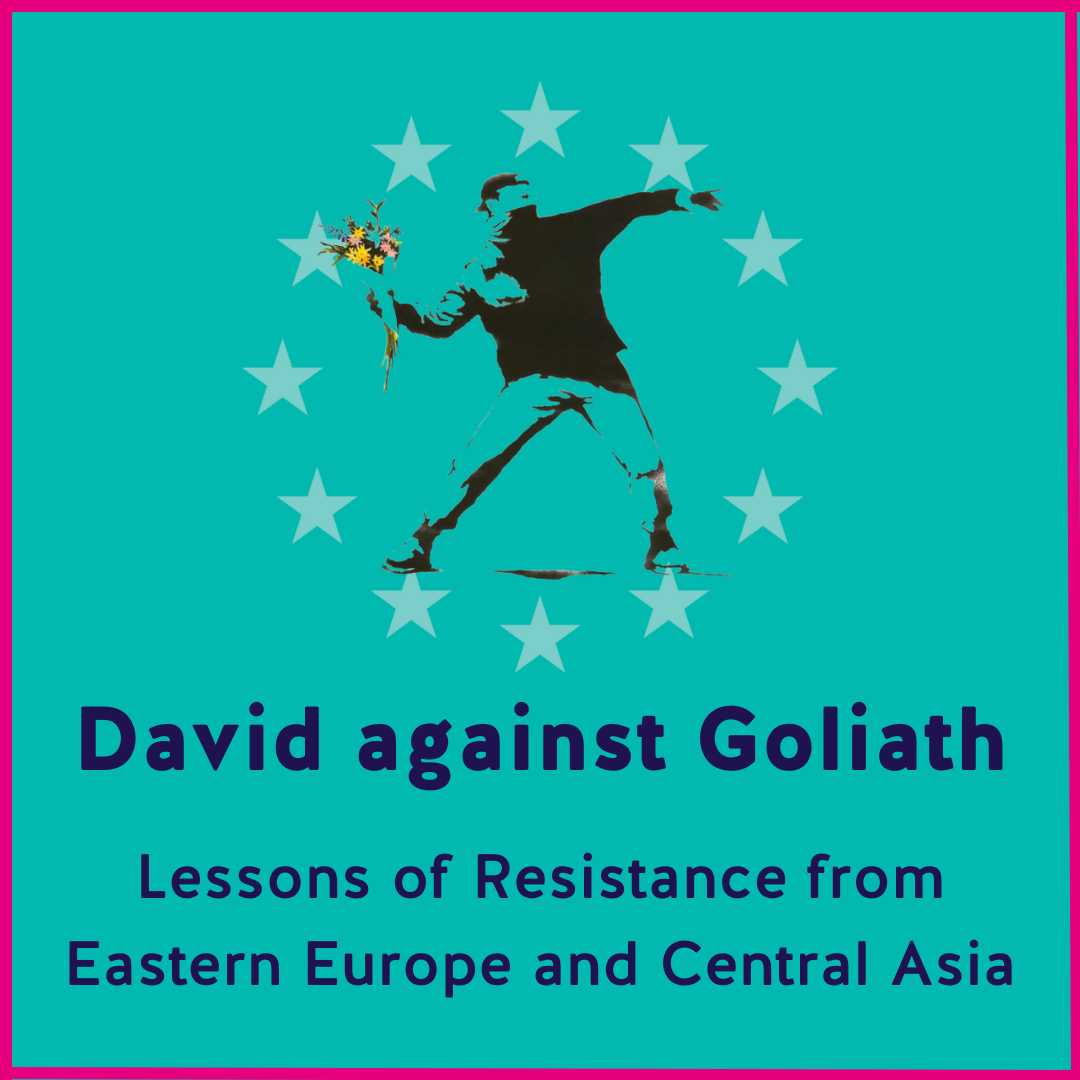This blog is part of the series “David against Goliath: Lessons of Resistance from Eastern Europe and Central Asia” by the Perspektive Ost program at Polis180.
Georgia has been in a protracted crisis since the parliamentary elections in October 2024. Once a pioneer of democratic reforms in the post-Soviet region, the country has become increasingly authoritarian under the current government and has turned its back on the West. While the Georgian government has suspended EU accession talks until at least 2028, public sentiment remains overwhelmingly pro-European, with civil society mobilizing in protests against the government’s increasingly authoritarian trajectory. Despite the repression, public opposition remains strong. Georgia is at a crucial point that will influence the future direction of the country: Either it follows the Euro-Atlantic path, or it falls even more under Moscow’s influence.
A blog by Celine Plöger and Johanna Lutz
Russian influence and European ambitions – Georgia’s path since the 1990s
Since Georgia’s independence in 1991, relations with Russia have been characterized by tensions. The secessionist conflicts in Georgia mainly concern the regions of South Ossetia and Abkhazia. To this day, Russia is gradually pushing the border into the Georgian heartland – with sometimes deadly consequences for civilians. According to journalist and media researcher Salome Belkania, the war crimes committed at the time – murders, torture, rape – were similar to those in today’s war in Ukraine.
Moscow acted as a destabilizing force early on, supporting separatist movements in Abkhazia and South Ossetia, as well as conducting a creeping annexation in both regions by issuing passports, economic integration and military presence. The conflicts are considered “frozen” but serve Moscow as a strategic means of controlled instability to secure its power in the South Caucasus. The Russian strategy of long-term destabilization through military presence and political influence is seen as part of a larger imperial project – in parallel to the actions against Ukraine.
Georgian Resistance – “We will throw roses instead of bullets at our enemies”
The Rose Revolution of 2003 marked a peaceful transition of power in Georgia, triggered by massive protests against electoral fraud after disputed parliamentary elections in Georgia. The new president, Mikheil Saakashvili, pursued a pro-Western course, the fight against corruption, the establishment of strong state institutions and national unity. The following years, Georgia followed a democratic path and centered its foreign policy around its integration in Western alliances and organisations, especially EU and NATO. This led to tensions with Russia, since Russia still placed Georgia in its sphere of influence. The Rose Revolution marked a turning point in Georgia’s orientation towards the West. Due to its geopolitical position as a transit country for energy resources from the Caspian region, Georgia is strategically important for the EU and part of the European Neighborhood Policy (ENP).
On August 7, 2008, Georgia attacked the South Ossetian capital Tskhinvali, officially to “restore constitutional order” – including the restoration of territorial integrity. Russia responded with a massive counterattack, marching across the border and advancing into the Georgian heartland, leading to the permanent Russian occupation of the region. The Five-Day War marked the end of mutually acceptable solutions and opened up a new front line between Russia and the West.
As a result of the defeat against Russia in the Five-Day War and Saakashvili’s increasingly authoritarian tendencies, the “Georgian Dream” (GD), an alliance founded by oligarch Bidzina Ivanishvili, took power in 2012. The new government initially pursued a liberal, pro-Western reform course. Georgia’s pro-Western policy led to a 2014 EU association agreement, establishing a free trade zone and visa-free Schengen travel. In 2018, the government enshrined integration into the EU and NATO as a foreign policy priority in the Georgian constitution. Following its 2022 membership application after Russia invaded Ukraine, the EU granted Georgia candidate status in December 2023.

Parliamentary elections in a tense political climate
On October 26, 2024, parliamentary elections were held in Georgia for the first time under the electoral law reform towards pure proportional representation. The political situation was already tense at this point: Since the start of Russia’s war of aggression against Ukraine in February 2022, the Georgian government had been striving to pursue a policy of neutrality, but this had de facto led to closer ties with Russia. The Georgian government’s official stance of neutrality is a calculated attempt to avoid provoking Russia, even at the cost of distancing itself from Western allies and democratic values. Despite its rhetoric, GD is increasingly aligning with Russia, driven by personal gains, fear of retaliation and a reluctance to take a firm stand. This development came to a head during the election campaign: while the opposition parties took a pro-European stance, the ruling GD-party was pro-Russian orientated. Even though 80 percent of Georgian society is rather pro-European, the opposition parties were not able to use this momentum to win the election.

GD’s victory must be seen above all in the context of the election. There is no fair political competition in Georgia. GD uses the fear of war in the wake of the Russian war of aggression in Ukraine and the allegation of LGBTQIA+ propaganda as key points against the West. International organizations and the opposition doubt the legitimacy of the election; so far, no democratic state has officially recognized the election results. As a reaction, opposition parties refused to accept their seats in parliament in order to avoid legitimizing the election results and jointly called for protests. Although most Georgians support a pro-European direction, the country remains deeply divided — GD’s power base lies primarily among the rural, older and more conservative population, which is strongly influenced by the Orthodox Church and more susceptible to pro-Russian narratives.
A decisive turning point was Prime Minister Irakli Kobakhidze’s announcement on November 28, 2024 that EU accession negotiations would be suspended until at least 2028, interrupting Georgia’s rapprochement with the EU. This led to the beginning of nationwide protests that have lasted more than 200 days as of publication, mainly supported by cultural workers, professors and students. The demonstrators are calling for new elections and closer ties with Europe and reject the authoritarian laws introduced by the pro-Russian government.
New laws and how they control civil society and the media
Under the leadership of GD, the political discourse is shifting away from democratic values towards authoritarian patterns. The increasing repression by the government can be understood as part of a process of de-Europeanization. A series of new laws serve to restrict civil society work, freedom of expression, political pluralism and an independent judiciary.
In December 2024, a package of laws came into force that, among other things, imposed heavy fines on minors participating in protests, displaying posters and wearing masks, and allowed preventive arrests of up to 48 hours. At the same time, the government is taking repressive action against civil servants who are critical of the government. Laws were passed that allow dismissals for political reasons. Furthermore, protesters are facing increasing penalties. In April 2025, the parliament finally passed a new version of the Foreign Agents Registration Act (FARA), which allows not only organizations but also individuals to be declared as foreign agents. Simultaneously, a new funding law was introduced that makes state agencies the only legal source of NGO funding. Foreign funds must be approved in advance, and violations are punishable by fines of twice the amount of funding.
The new laws sharply restrict core freedoms and tighten state control over civil society and the media, creating deep uncertainty. NGOs, CSOs, and independent media face potential legal risks and funding challenges, but unclear enforcement leaves many in limbo. This uncertainty has led to a paralysis, which, while by no means bringing activism and civic engagement to a standstill, has made many actors more cautious. Despite a decline in overall numbers, protests continue to take place daily in several Georgian cities, with Rustaveli Avenue in Tbilisi blocked by demonstrators every evening. A routine that has taken on a surreal rhythm as police clear the square and protesters block the street. What began as spontaneous mass gatherings has evolved into a more strategic movement. In response to increased state repression, through AI surveillance, legal intimidation, and police violence, protesters have adapted with caution and creativity: using masks, anonymity, and civil disobedience to maintain momentum.

Conclusion
For the Georgian population, the EU is seen as a beacon of hope – partly due to the fear that its own history could repeat itself. In retrospect, the 2008 NATO summit in Bucharest, at which Georgia and Ukraine were assured of future membership but not actually granted it, is seen as a missed opportunity to take a more decisive stance against Russian aggression.
With Georgia being caught between Moscow and Brussels, the EU must take more decisive action against the authoritarian tendencies of the ruling Georgian Dream party and at the same time play a stronger financial and strategic role in Georgia’s democratic transformation process. The EU should seriously consider imposing targeted sanctions against leading representatives of the ruling Georgian Dream party and pro-Russian actors.
The withdrawal of the United States from development cooperation with Georgia – in particular the discontinuation of USAID – represents a considerable burden for Georgian civil society. Especially in the current political situation, there is a lack of resources to effectively support civil society initiatives, protest movements and independent journalism.
The European Union in particular should support Georgian civil society. It should step in and compensate for the financial deficits by immediately deploying existing EU tools for protecting human rights activists (e.g., the Human Rights and Civil Society Program, Rapid Response Pillar). Furthermore, the continued support for legal aid, civil liberties defenders, and victims of state abuse is needed – even if this means bypassing formal partnerships and working with individuals or informal groups.
Independent media in particular play a key role in the fight against disinformation and Russian propaganda – strengthening them is of central importance for the country’s democratic aspirations. The EU should establish new funding mechanisms to sustain independent journalism by preparing contingency plans for the relocation and remote work of journalists, using strategies applied in Ukraine and Belarus. While these measures may not fully halt the decline of Georgia’s civil society, they are necessary to ensure that EU and donor responses remain relevant and effective in an increasingly authoritarian environment.
In addition, more public attention must be paid to the situation in Georgia. As a geopolitical link between Europe and the Caucasus, the country is an important part of the European sphere of influence. The reaction of the international community – and the EU in particular – in the coming months will be decisive in determining whether the democratic regression can be halted and Georgia brought back onto its path toward democracy.
The protest movement that emerged in late 2024 has become a defining force in Georgia’s struggle for democratic self-determination. As the government leans further toward authoritarianism and Russian alignment, civil society continues to resist – demanding a future rooted in European values. Despite state repression, the resistance is still present – supported by a broad, pro-European movement characterized by civil society. While the decentralized nature of the protests has helped avoid government co-optation, the absence of a unified leadership may also limit their long-term strategic effectiveness.
Celine Plöger is a Polis-member since April 2025. She is a Social and Political Scientiest with regional expertise in Eastern Europe – especially Western Balkans and South Caucasus.
Johanna Lutz joined Polis in April 2025. She studies Peace and Conflict Studies in Osnabrück and is particularly interested in the South Caucasus and Central Asia.
Previously from the blog series “David against Goliath: Lessons of Resistance from Eastern Europe and Central Asia”
-

Let’s Start Looking East…and Listening to them, too!
-

The Fight for the Diaspora – About Grievances and National Identity in Romanian Elections
-

Georgia’s fight for EU: Protests against Russian interference
-

Are the Streets Enough? Lessons from Protests in Serbia and Georgia
-

Qandy Qantar – Bloody January and the silencing of a Nation
-

Ukraine’s Underground Resistance: The Unseen Battle for Sovereignty
The Polis Blog serves as a platform at the disposal of ‘Polis180’s & ‘OpenTTN‘s members. Published comments express solely the ‘authors’ opinions and shall not be confounded with the opinions of the editors or of Polis180.
Zurück